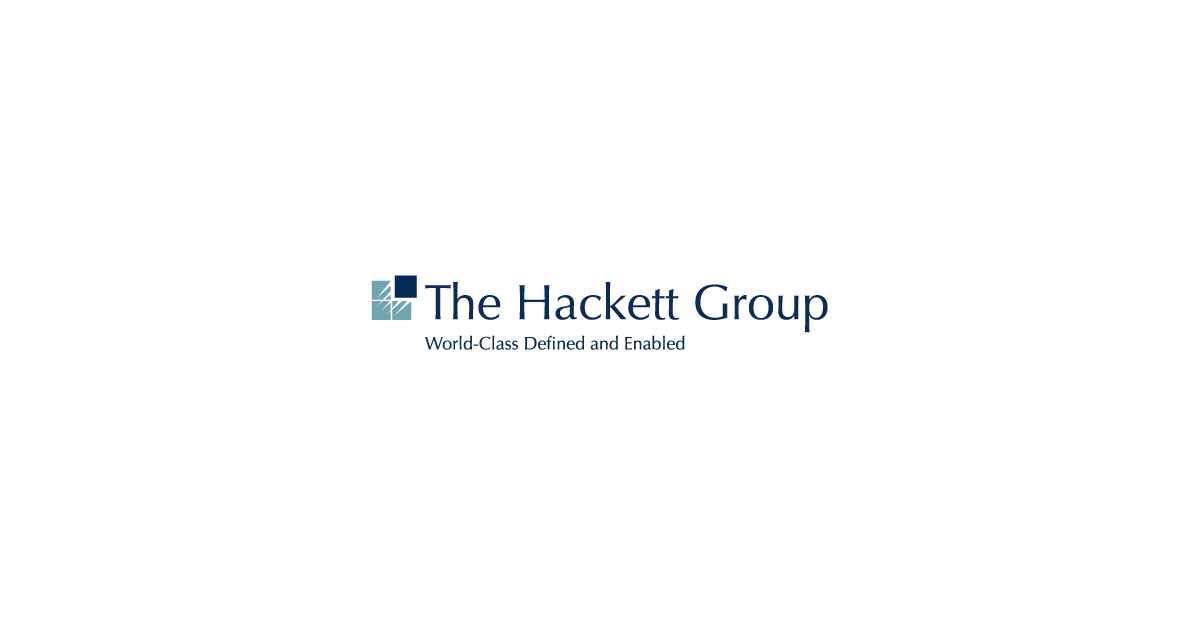MIAMI & LONDON–(BUSINESS WIRE)–The pandemic has caused significant changes in the working capital performance of the 1,000 largest non-financial U.S. companies in 2020, according to new research from The Hackett Group, Inc. (NASDAQ: HCKT). Declines in revenue and cost of goods sold were seen across many industries, and this was a major factor affecting overall working capital performance, according to the survey. But companies have also dramatically slowed payments to suppliers, and disrupted demand and unsold products have driven inventories to higher levels. Additionally, companies increased cash on hand by 40% to protect against the impact of the pandemic and continued to take on debt at record levels, with debt increasing 10% year-on-year. Capital spending also fell to historic lows as companies cut spending and conserved cash in anticipation of further market uncertainty.
Days payable past due (DPO) was the biggest change in working capital evident in 2020, up 7.6%, with typical businesses now taking over 62 days to pay their suppliers, an all-time high. Days of Backorder (DSO) and Days of Backorder Inventory (DIO) also reached all-time highs. DSO up 3.8% at 41.5 days and DIO up 7.1% at 54.4 days.
The Hackett Group’s research identified a working capital improvement opportunity of over $1.2 trillion among surveyed companies. Top quartile companies now convert cash more than 3x faster than typical companies (15.7 days vs. 46.4 days). Top performers collect from customers 41% faster (29.0 days vs. 48.8 days), hold less than half the inventory (29.4 days vs. 62.5 days), and pay suppliers 56% slower ( 76.7 days versus 49.3 days). The biggest year-over-year change is in debt, where the performance gap between top quartile companies and median companies increased by 10 percentage points in 2020.
Overall, the cash conversion cycle (CCC), a standard measure of working capital performance, deteriorated by 2% in 2020, due to increased inventory and receivables. But excluding the oil and gas industry, which faced particular challenges due to falling oil and gas prices, CCC actually improved by 4%. Performance also varied considerably in other industries. Business shutdowns, lockdowns, and stay-at-home orders have impacted many industries, leading to working capital deterioration across many industries, including airlines (903% year-over-year CCC deterioration). other), hotels and recreation (47% deterioration), as well as railways and trucking. (25% deterioration). But pandemic-related shifts in demand have allowed companies in some industries to see improvements in working capital performance. These included Household and Personal Care (113% year-over-year improvement in CCC), Media (106% improvement), and Internet and Catalog Retail (65% improvement) .
The survey also found cash on hand rose 40% year-on-year, the first significant increase in a decade, as companies seek to hedge against continued uncertainty and, in some cases, to prepare for potential opportunities. Debt continued its long-term climb, spurred by low interest rates and available credit, rising 10% year-over-year. Debt has increased by 67% since 2015. The pandemic has also caused companies in many sectors to cut capital expenditure, with capital expenditure down by 10%.
The Hackett Group’s annual working capital survey is featured in the June/July issue of CFO magazine. A summary of the Hackett Group’s 2021 Working Capital Survey results is available free of charge, with registration, at this link: http://go.poweredbyhackett.com/uswcspg2106sm
“Liquidity was critically important as companies responded to the pandemic, pushing them to conserve cash and increase debt, to put themselves in a better position to extend terms to customers, support suppliers and cope. unforeseen changes in market conditions,” said Craig Bailey. , Associate Director, Strategy and Business Transformation, The Hackett Group. “When it comes to debt, we’ve seen many companies simply force their suppliers to take 30-day contract extensions. But some have been able to help weaker suppliers protect their supply chains. On the inventory side, companies in many industries have seen their revenues fall dramatically and have responded by consolidating their offerings or otherwise simplifying their product line.
“The pandemic has also caused significant changes in consumer shopping habits,” Bailey said. “Customers have relied heavily on e-commerce over the past year, and looking to the future, it’s hard to predict if or when traditional demand patterns and shopping habits will return. Businesses need to foster greater agility, so they can scale up or down production to meet demand, and also change sales channels as needed, shifting more business to e-commerce if customer demand warrants. .
“Inventory management will also be essential. There is a lot of uncertainty going forward, and companies that have a greater ability to manage inventory levels will be in a better position to react quickly to changes in the market. But inventory has always been a difficult area for businesses to optimize for, because different parts of a business, like sales or manufacturing, often have competing inventory priorities and goals.
The Hackett Group Working Capital Survey and Scorecard calculates working capital performance based on the latest publicly available annual financial statements of the 1,000 largest non-financial corporations headquartered in the United States, from FactSet/FactSet Fundamentals. The survey takes an industry-wide approach to rank companies based on four key working capital metrics: Days Sales Outstanding (DSO), Days Inventory Outstanding (DIO), Days Payables Outstanding (DPO) and Cash Conversion Cycle (CCC). For each industry, companies are ranked by total number of CCC days. Companies are classified according to the FactSet industry classification system, using data from FactSet. For the purposes of the survey and presentation of results, we have grouped some industries together. Historical comparisons within the survey are made on a comparable basis.
About Hackett Group
The Hacket Group® (NASDAQ:HCKT) is an intellectual property-based strategic consultancy and leading enterprise benchmarking firm for global enterprises, delivering digital transformation, including enterprise cloud application implementation industry-leading workflow automation and analytics that enable world-class digital performance.
Backed by our unparalleled intellectual property from nearly 20,000 benchmark studies of the world’s largest companies – including 93% of the Dow Jones Industrials, 91% of the Fortune 100, 80% of the DAX 30 and 55% of the FTSE 100 – captured through our leading benchmarking platform, Quantum Leap®and our Digital Transformation Platform (DTP), we are accelerating the implementation of best practices.
More information about The Hackett Group is available at: www.thehackettgroup.com, [email protected], or by calling (770) 225-3600.
Caution regarding “forward-looking” statements
This release contains “forward-looking” statements within the meaning of Section 27A of the Securities Act of 1933, as amended, and Section 21E of the Securities Exchange Act of 1934, as amended. Statements including, but not limited to, words such as “expects”, “anticipates”, “intends”, “plans”, “believes”, researches, “estimates” or others similar expressions or variations of such words or similar expressions indicating present or anticipated or expected future events or results are intended to identify such forward-looking statements. Forward-looking statements are not statements of historical fact and involve known and unknown risks, uncertainties and other factors that may cause the actual results, performance or achievements of the Company to be materially different from the results, performance or achievements expressed or implied by the forward-looking statements. . Factors that could impact these forward-looking statements include, but are not limited to, Hackett’s ability to effectively market its digital transformation and other consulting services, competition from other consulting and technology companies that may having or developing similar offerings in the future, the commercial viability of Hackett and its services, and other risks detailed in Hackett’s filings with the United States Securities and Exchange Commission. Hackett undertakes no obligation to update this release or any forward-looking statement contained herein.












